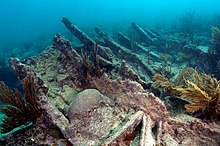SS Arratoon Apcar
 SS Arratoon Apcar in 1873
| |
| History | |
|---|---|
| Name | SS Arratoon Apcar |
| Owner | H.F. Swan Company |
| Port of registry | London |
| Builder | James Henderson and Son, Renfrew |
| Launched | 27 June 1861 |
| Completed | 1861 |
| Out of service | 17 February 1878 |
| Fate | Sunk |
| Notes | 25°35′25″N 80°05′48″W / 25.590283°N 80.096667°WCoordinates: 25°35′25″N 80°05′48″W / 25.590283°N 80.096667°W |
| General characteristics | |
| Type | Steam ship |
| Displacement | 1,480 tons |
| Length | 262 feet (80 m) |
| Beam | 35 feet (11 m) |
| Installed power | 250hp Steam |
| Crew | 24 |
SS Arratoon Apcar was an iron-hulled steamship built in 1861 for the Apcar Line. She ran ashore on Fowey Rocks off the coast of Florida on 17 February 1878, was abandoned 3 days later, and broke apart. Today the wreck is a good location for scuba diving.
Construction and service[]
SS Arratoon Apcar was built in Renfrew, Scotland by James Henderson and Son.[1] The ship was powered by a 250 hp steam engine, with an iron hull. She was 261.7 feet (79.8 m) long, 35.2 feet (10.7 m) wide and had a displacement of 1,480 tons. She was launched on 27 June 1861.[2] She was named after the founder of Apcar and Company of Bombay, India, for whom she was built. In 1872 the Apcar family purchased a considerably larger ship that they also called Arratoon Apcar, selling the older ship to H.F. Swan Company.[1]
Wreck[]

SS Arratoon Apcar was en route from Havana, Cuba to Liverpool, England when she ran aground on 17 February 1878 on Fowey Rocks, due to a miscalculation by Captain Pottinger.[1] The reef had already claimed other ships.[1] Several workmen were camped on a platform on the new screw pilings of the Fowey Rocks Light that they were building on the rocks. They were almost hit by the ship, which was stopped by the rocks only 200 yards (180 m) away.[2]
The crew of the ship spent three days trying to pump her out before abandoning her and heading for the shore in their lifeboats. The captain and his complete crew of 24 men were picked up by the Tappahannock.[1] Foul weather pushed the ship onto the reef, pounding her on the rocks.[3] The ship broke up and was a total loss by 12 March 1878.[1]
Mistaken identity[]
The wreck now tentatively identified as the Arratoon Apcar was known for many years as the Arakanapka,[4] and is so called in books[5] and on various dive-related web sites.[6]
Today[]
The wreck now lies in 10 to 20 feet (3.0 to 6.1 m) of water near the Fowey Rocks. The lower hull and irons beams of the ship are still visible, encrusted with coral, and there are some remains of other parts of the ship. There are many fish, and with shallow water the location provides an excellent site for snorkeling or diving. However, the shallow waters near the reef may create strong surges that could damage a boat.[1] The Arratoon Apcar is one of five historic wrecks in the Biscayne National Park "Shipwreck Trail".[3]
References[]
Citations
- ^ a b c d e f g Arratoon Apcar: NPS.
- ^ a b The Alleged Arratoon Apcar Wreck Site.
- ^ a b Arratoon Apcar: DiveSpots.com.
- ^ Morgan, Curtis (10 July 2005). "Underwater trail highlights shipwrecks off Miami". The Miami Herald. Archived from the original on 18 May 2009. Retrieved 24 August 2014.
- ^ Dean, Love (1982). Reef Lights: Seaswept Lighthouses of the Florida Keys. Key West, Florida: The Historic Key West Preservation Board. p. 99. ISBN 0-943528-03-8.
- ^ "FLORIDA East Coast Shipwrecks Arakanapka Wreck Biscayne park". Archived from the original on 16 January 2020. Retrieved 17 December 2020.
Sources
- "Arratoon Apcar". DiveSpots.com, LLC. Archived from the original on 22 August 2017. Retrieved 17 December 2020.
- "Arratoon Apcar". National Park Service, U.S. Department of the Interior. Retrieved 4 November 2013.
- "The Alleged Arratoon Apcar Wreck Site". Marine Archaeological Research & Conservation Inc. 2006. Archived from the original on 7 March 2016. Retrieved 17 December 2020.
- Ships built on the River Clyde
- 1861 ships
- Shipwrecks of the Florida coast
- Wreck diving sites
- 1861 in Scotland
- Biscayne National Park
- Maritime incidents in February 1878
